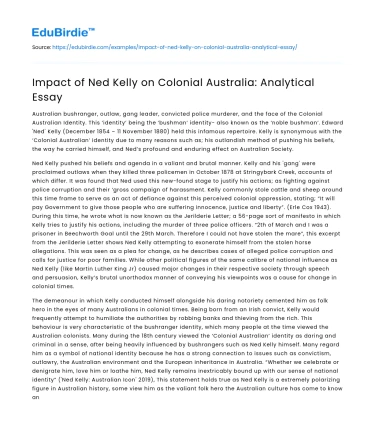Australian bushranger, outlaw, gang leader, convicted police murderer, and the face of the Colonial Australian Identity. This ‘identity’ being the ‘bushman’ identity- also known as the ‘noble bushman’. Edward 'Ned' Kelly (December 1854 – 11 November 1880) held this infamous repertoire. Kelly is synonymous with the ‘Colonial Australian’ identity due to many reasons such as; his outlandish method of pushing his beliefs, the way he carried himself, and Ned’s profound and enduring effect on Australian Society.
Ned Kelly pushed his beliefs and agenda in a valiant and brutal manner. Kelly and his 'gang' were proclaimed outlaws when they killed three policemen in October 1878 at Stringybark Creek, accounts of which differ. It was found that Ned used this new-found stage to justify his actions; as fighting against police corruption and their ‘gross campaign of harassment. Kelly commonly stole cattle and sheep around this time frame to serve as an act of defiance against this perceived colonial oppression, stating; “It will pay Government to give those people who are suffering innocence, justice and liberty”. (Erle Cox 1943). During this time, he wrote what is now known as the Jerilderie Letter; a 56-page sort of manifesto in which Kelly tries to justify his actions, including the murder of three police officers. “2th of March and I was a prisoner in Beechworth Goal until the 29th March. Therefore I could not have stolen the mare”, this excerpt from the Jerilderie Letter shows Ned Kelly attempting to exonerate himself from the stolen horse allegations. This was seen as a plea for change, as he describes cases of alleged police corruption and calls for justice for poor families. While other political figures of the same calibre of national influence as Ned Kelly (like Martin Luther King Jr) caused major changes in their respective society through speech and persuasion, Kelly’s brutal unorthodox manner of conveying his viewpoints was a cause for change in colonial times.
Save your time!
We can take care of your essay
- Proper editing and formatting
- Free revision, title page, and bibliography
- Flexible prices and money-back guarantee
The demeanour in which Kelly conducted himself alongside his daring notoriety cemented him as folk hero in the eyes of many Australians in colonial times. Being born from an Irish convict, Kelly would frequently attempt to humiliate the authorities by robbing banks and thieving from the rich. This behaviour is very characteristic of the bushranger identity, which many people at the time viewed the Australian colonists. Many during the 18th century viewed the ‘Colonial Australian’ identity as daring and criminal in a sense, after being heavily influenced by bushrangers such as Ned Kelly himself. Many regard him as a symbol of national identity because he has a strong connection to issues such as convictism, outlawry, the Australian environment and the European inheritance in Australia. “Whether we celebrate or denigrate him, love him or loathe him, Ned Kelly remains inextricably bound up with our sense of national identity” ('Ned Kelly: Australian Icon' 2019), This statement holds true as Ned Kelly is a extremely polarizing figure in Australian history, some view him as the valiant folk hero the Australian culture has come to know and love, while others at the time saw him as a ‘blood-thirsty’ and a ‘killer’(Hocking, 2004).
The weight and significance of the Kelly Gang, and most importantly Ned, brought upon many changes in the solidification of ‘Colonial Australian’ Identity. In the late 18th century, this gang of bushrangers had become a household name, as their thieving and heroic acts had been etched into Australian history. Kelly's Irish heritage, his contempt for and success in humiliating the authorities, his harsh and some say unfair treatment, his bad luck and his daring and notoriety have ensured Kelly's place as folk hero (State Library of Victoria). Alongside this, his defiant acts against discrimination and his pleas for justice solidified people’s view of him as a Mr. Flannery-esque folk Hero who also stood up for liberty and justice. Ned Kelly’s impact on the as the ‘Colonial Australian’ icon is evident from the spectacular Sydney 2000 Olympic Games opening ceremony, in which a group of armoured Kelly figures paraded waving mock firearms spouting streams of sparks (Bruce Astbury & Jed Donoghue 2011).
The Irish-born Edward 'Ned' Kelly was thrust into the day-to-day life of brutal harassment and police brutality of Victoria, but although bridled by this, by killing to push his agenda, carrying himself in the manner of a folk hero, Ned cemented his legacy as the ‘noble bushman identity’. His story has withstood the testament of time to provide an enduring effect on Australian Society and cementing his significant role in the ‘Colonial Australian’ identity






 Stuck on your essay?
Stuck on your essay?

